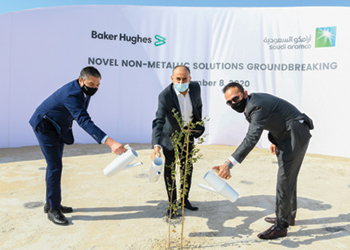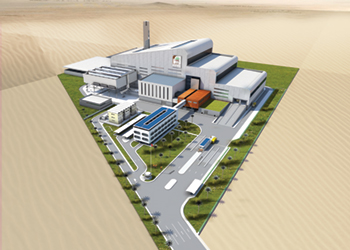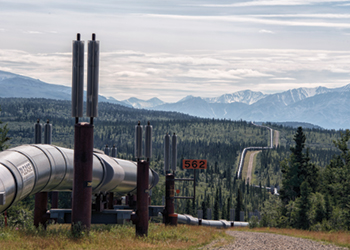
Eni discovers oil in Egyptian desert
MILAN: Italian oil major has Eni has announced a new oil discovery, in Meleiha Concession, in the Western Desert of Egypt. The discovery was achieved through the Arcadia 9 well, drilled on the Arcadia South structure, which is located 1.5 km south of the main Arcadia field already in production. The well encountered 85 ft of oil column in the Cretaceous sandstones of the Alam El Bueib 3G formation. The well has been drilled close to existing production facilities and is already tied-in to production, with a stabilized rate of 5,500 barrels of oil per day.
The new discovery adds 10,000 barrels of oil per day to Eni's gross production in the Western Desert of Egypt.
Iraq to boost ports crude export capacity
DUBAI: Iraq aims to increase crude oil export capacity from its southern ports to 6 million barrels per day from the current 3.5 million barrels a day capacity, Karim Hattab, deputy oil minister for distribution affairs said. He said the increased capacity would be after 2023 and that the plan includes building 24 storage tanks.
Methanol capacity to grow by 2030
DUBAI: Global methanol capacity is poised to see considerable growth by 2030, potentially increasing from 148.44 million tonnes per annum (mtpa) in 2019 to 310.94 mtpa in 2030, registering a total growth of 109 per cent.
Russia, Iran and the US are expected to drive capacity additions during the forecast period. Together these three countries will contribute around 59 per cent of the total global methanol capacity additions, GlobalData said.
GlobalData’s report, ‘Global Methanol Capacity and Capital Expenditure Outlook to 2030’ revealed that Russia accounts for the highest capacity additions with 40.35 mtpa by 2030. Major capacity additions will be from the Sherwood Energy Maysky Methanol Plant with a capacity of 7.20 mtpa by 2030.
GlobalData has identified Iran as the second highest country in terms of capacity additions, with capacity of 29.39 mtpa by 2030. Major capacity additions will be from the Mahan Chemical Zagros Petrochemical Eslamabad-e-Gharb Methanol Plant, with a capacity of 1.85 mtpa by 2030. The US will be the third highest country in terms of capacity additions, with capacity of 23.74 mtpa by 2030. Major capacity additions will be from the NW Innovation Works Kalama Methanol Plant and NW Innovation Works St. Helens Methanol Plant, each with the capacity of 3.60 mtpa by 2030.
Masdar secures Uzbek solar project
ABU DHABI: Masdar, a subsidiary of Mubadala Investment Company and a leading renewable energy companies, has announced the financial close of the Nur Navoi Solar Project, the first successfully-financed independent power producer (IPP) solar project in Uzbekistan.
Loan and guarantee agreements to finance the 100-megawatt photovoltaic plant were signed in a virtual ceremony with representatives from Masdar, Uzbekistan’s Ministry of Investments and Foreign Trade (MIFT), the International Finance Corporation (IFC), Asian Development Bank (ADB), the World Bank Group (WBG) and the European Bank for Reconstruction and Development (EBRD).
"This landmark project will drive the development of Uzbekistan’s independent power producer market, and enable us to increase the share of renewable energy in the energy mix," said Shukhrat Vafaev, Deputy Minister of Investments and Foreign Trade of Uzbekistan.
The Nur Navoi Solar Project was awarded to Masdar last year under the WBG’s Scaling Solar programme, with Masdar tendering the lowest tariff in a competitive auction.
Gazprom loses Finland LNG share
VILNIUS: Gazprom has lost a third of its share of the Finnish gas market after a new pipeline made it possible to import liquefied natural gas (LNG) via the Baltic States. The Balticconnector pipeline, which opened early this year, links Finland and Estonia and can also send gas to the Baltics.
In the first nine months of 2020, a total of 5.8 terawatt-hours (TWh) of gas was exported to Finland via the pipeline. Meanwhile, direct gas exports from Russia to Finland over same period dropped by 35 per cent to 11.4 TWh, from 17.6 TWh over Jan-Sept in 2019.
Natural gas prices between Finland and the Baltic states of Estonia, Latvia and Lithuania vary due to their access to the global LNG market, ability to store gas in Latvia and different Russian gas supply contracts.
Haroldas Nauseda, board member at Lithuanian state-controlled gas trader Ignitis, told Reuters: "In 2019, gas in Finland cost about 7 euros per MWh more than in Lithuania, a difference of 150 million euros for the full year. Today, there's little difference left."
Gazprom is also facing competition in other parts of Europe from LNG imports, including from the United States.
The Baltic and Finnish gas markets will be connected to mainland Europe at the end of 2021 by a new pipeline linking Lithuanian and Polish gas grids.
Mass carbon capture plant planned
OSLO: Aker Solutions has secured a contract from Aker Carbon Capture for engineering, procurement and management assistance to realise the CO2 capture plant at Norcem’s cement factory in Brevik, Norway. The project will start in January 2021 and work will be completed in 2024. The contract has a value of about NOK500 million ($57.6 million).
The plant will become the world’s first large-scale capture plant at a cement producer, capturing some 400,000 metric tons of CO2 annually.
200m barrels of oil found in Norway
OSLO: ConocoPhillips made an oil discovery in the Norwegian Sea north of the Heidrun field.
The discovery is estimated to hold between 76 million and 201 million barrels of recoverable oil equivalent, and could potentially be developed by using the existing infrastructure in the area, the NPD said.
ConocoPhillips has an 80 per cent stake in the license where the well was drilled, while privately held Pandion Energy holds the remaining 20 per cent stake.
It was the second petroleum discovery made by ConocoPhillips in the Norwegian Sea in two months. In November, the US firm found natural gas southwest of the Skarv field.
Greenpeace loses Arctic oil case
OSLO: Norway's supreme court approved the government's plans for Arctic oil exploration on Tuesday, dismissing a lawsuit by campaigners who claimed the scheme violated people's right to a healthy environment.
The verdict upheld rulings made by two lower courts, rejecting arguments by Greenpeace and the Nature and Youth group that a 2015-2016 oil licensing round giving awards to Equinor and others had breached Norway's constitution.
While the case was specifically about ten exploration licenses awarded four years ago, the environmental campaigners had hoped that their appeal would set a precedent limiting the oil industry's Arctic expansion.
"The supreme court is rejecting the appeal," Chief Justice Toril Marie Oeie said as she announced the verdict.
The Nature and Youth advocacy group criticised the outcome.
"This means today's youth lacks fundamental legal protection from environmental damage jeopardising our future... This is shocking and we are furious," the NGO.





















































































